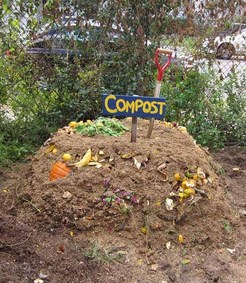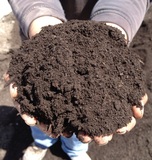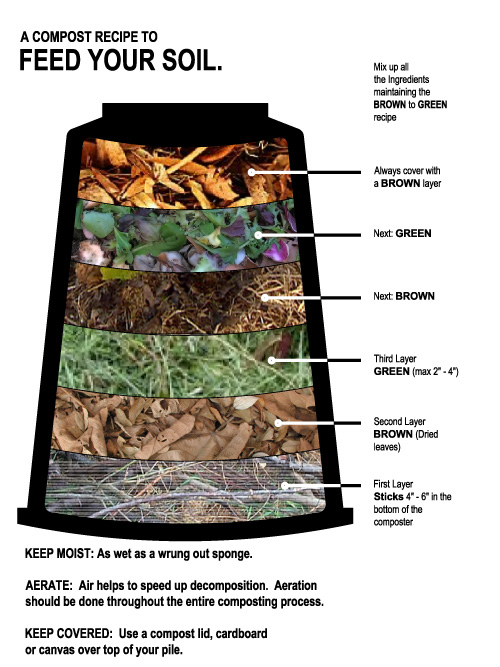
While it takes thousands of years for the earth’s forces to build good soil, we can help do this in 5 – 10 years by adding compost—which adds microorganisms, arthropods, worms, and humus to the soil. The word “compost” comes from Latin where it meant “to put together.” This is what we do when we compost—we put together the correct amounts of compostable materials to make a great soil amendment.
1. Composting provides a partial solution to an issue of great concern in many communities. All around the world, landfills are filling up, garbage incineration is becoming increasingly unpopular, and other waste disposal options are becoming ever harder to find. Composting provides a way not only of reducing the amount of waste that needs to be disposed of, but also of converting it into a product that is useful for gardening, landscaping, or house plants.
1. Composting provides a partial solution to an issue of great concern in many communities. All around the world, landfills are filling up, garbage incineration is becoming increasingly unpopular, and other waste disposal options are becoming ever harder to find. Composting provides a way not only of reducing the amount of waste that needs to be disposed of, but also of converting it into a product that is useful for gardening, landscaping, or house plants.

2. Teach sustainability to future generations - By addressing the solid waste issue, composting provides a way of instilling in children a sense of environmental stewardship. Many educational programs Composting focuses on reducing, reusing, and recycling our solid wastes and takes it a step beyond. With composting, children can do more than just send cans or newspapers off for recycling -- they can experience the entire cycle, from "yucky" food scraps or other organic wastes... to something that is pleasant to handle and is good for the soil. Contrary to the "out of sight, out of mind" philosophy, children who compost become aware of organic wastes as potential resources rather than just as something "gross" to be thrown away and forgotten. They learn through direct experience that they personally can make a difference and have a positive effect on the environment.
3. Create great soil for your garden - Composting can successfully be carried out at a wide range of scales, from multi-acre commercial to simple backyard heaps. A common assumption is that composting makes sense only 'out in the country or in suburban areas' where people have large yards. Some of the most avid composters, however, live in the heart of inner cities, where the compost they make helps to restore or replace worn-out or contaminated soils for home, school or community gardens. These gardens and accompanying compost systems appear in former vacant lots, and even on roof tops and balconies buildings.
4. Compost enriches soils - Compost has the ability to help regenerate poor soils. The composting process encourages the production of beneficial micro-organisms (mainly bacteria and fungi) which in turn break down organic matter to create humus. Humus—a rich nutrient-filled material—increases the nutrient content in soils and helps soils retain moisture. Compost has also been shown to suppress plant diseases and pests, reduce or eliminate the need for chemical fertilizers, and promote higher yields of agricultural crops.
5. Compost helps cleanup (remediate) contaminated soil - The composting process has been shown to absorb odors and treat semivolatile and volatile organic compounds (VOCs), including heating fuels, polyaromatic hydrocarbons (PAHs), and explosives. It has also been shown to bind heavy metals and prevent them from migrating to water resources or being absorbed by plants. The compost process degrades and, in some cases, completely eliminates wood preservatives, pesticides, and both chlorinated and nonchlorinated hydrocarbons in contaminated soils.
6. Compost helps prevent pollution - Composting organic materials that have been diverted from landfills ultimately avoids the production of methane and leachate formulation in the landfills. Compost has the ability to prevent pollutants in stormwater runoff from reaching surface water resources. Compost has also been shown to prevent erosion and silting on embankments parallel to creeks, lakes, and rivers, and prevents erosion and turf loss on roadsides, hillsides, playing fields, and golf courses.
7. Using compost offers economic benefits - Using compost can reduce the need for water, fertilizers, and pesticides. It serves as a marketable commodity and is a low-cost alternative to standard landfill cover and artificial soil amendments. Composting also extends municipal landfill life by diverting organic materials from landfills and provides a less costly alternative to conventional methods of remediating (cleaning) contaminated soil. In a home garden, you reap the benefit of always having fresh soil for your gardens and planters.
3. Create great soil for your garden - Composting can successfully be carried out at a wide range of scales, from multi-acre commercial to simple backyard heaps. A common assumption is that composting makes sense only 'out in the country or in suburban areas' where people have large yards. Some of the most avid composters, however, live in the heart of inner cities, where the compost they make helps to restore or replace worn-out or contaminated soils for home, school or community gardens. These gardens and accompanying compost systems appear in former vacant lots, and even on roof tops and balconies buildings.
4. Compost enriches soils - Compost has the ability to help regenerate poor soils. The composting process encourages the production of beneficial micro-organisms (mainly bacteria and fungi) which in turn break down organic matter to create humus. Humus—a rich nutrient-filled material—increases the nutrient content in soils and helps soils retain moisture. Compost has also been shown to suppress plant diseases and pests, reduce or eliminate the need for chemical fertilizers, and promote higher yields of agricultural crops.
5. Compost helps cleanup (remediate) contaminated soil - The composting process has been shown to absorb odors and treat semivolatile and volatile organic compounds (VOCs), including heating fuels, polyaromatic hydrocarbons (PAHs), and explosives. It has also been shown to bind heavy metals and prevent them from migrating to water resources or being absorbed by plants. The compost process degrades and, in some cases, completely eliminates wood preservatives, pesticides, and both chlorinated and nonchlorinated hydrocarbons in contaminated soils.
6. Compost helps prevent pollution - Composting organic materials that have been diverted from landfills ultimately avoids the production of methane and leachate formulation in the landfills. Compost has the ability to prevent pollutants in stormwater runoff from reaching surface water resources. Compost has also been shown to prevent erosion and silting on embankments parallel to creeks, lakes, and rivers, and prevents erosion and turf loss on roadsides, hillsides, playing fields, and golf courses.
7. Using compost offers economic benefits - Using compost can reduce the need for water, fertilizers, and pesticides. It serves as a marketable commodity and is a low-cost alternative to standard landfill cover and artificial soil amendments. Composting also extends municipal landfill life by diverting organic materials from landfills and provides a less costly alternative to conventional methods of remediating (cleaning) contaminated soil. In a home garden, you reap the benefit of always having fresh soil for your gardens and planters.


 RSS Feed
RSS Feed